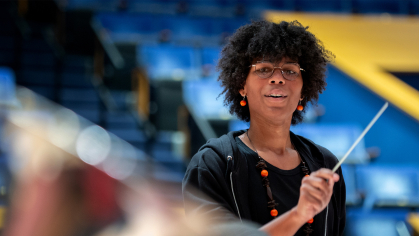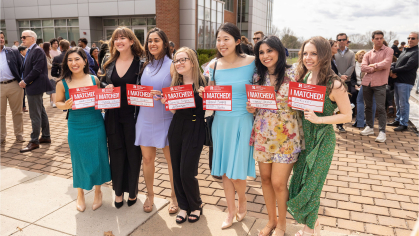Four Rutgers Students Earn Prestigious Goldwater Scholarships
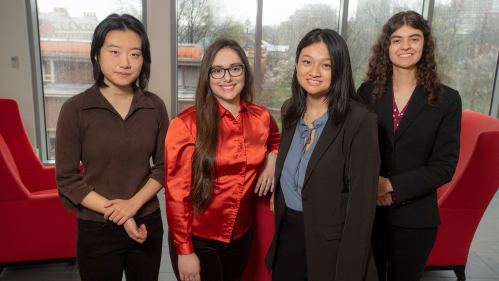
Elisa Bu Sha, Julianne Chan, Anisha Jackson and Annie Wei earned the national honor encouraging research careers
Four Rutgers University-New Brunswick students have been selected as Goldwater Scholars, a prestigious national honor for undergraduates who plan to pursue research careers in the natural sciences, mathematics and engineering.
Elisa Bu Sha, Julianne Chan, Anisha Jackson and Annie Wei are studying topics including neurobiology, environmental contaminants in water, regenerative tissue engineering and higher-level mathematics.
Rutgers-New Brunswick was the top institution in New Jersey for Goldwater Scholars, said Anne Wallen, director of the Office of Distinguished Fellowships at Rutgers-New Brunswick.
“Rutgers can be proud of our support for undergraduate research across disciplines,” said Wallen. “These young women have had a range of stellar experiences and great mentors here that helped set them apart at the national level.”
Named after the late Sen. Barry Goldwater, the undergraduate research scholarship program recognizes outstanding students and encourages them to pursue careers in mathematics, natural sciences or engineering.
It is the 19th consecutive year that Rutgers-New Brunswick students have been selected as Goldwater Scholars, which awards recipients up to $7,500 to help cover costs associated with room and board, tuition, fees and books. Winners were chosen from a pool of more than 5,000 college sophomores and juniors nominated by 446 academic institutions.
“Anisha, Annie, Elisa, and Julianne are outstanding students who represent the best of Rutgers-New Brunswick,” said Rutgers-New Brunswick Chancellor Francine Conway. “Our community is so proud of their accomplishments and so honored to have provided the resources that helped them succeed.”
Here are Rutgers-New Brunswick’s 2024 Goldwater Scholars:
Elisa Bu Sha
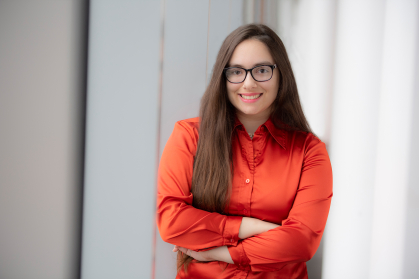
Before starting college, Elisa Bu Sha seemed destined for a career in the arts. She studied classical ballet for 12 years, performed in musicals, and wrote for her high school’s theater department.
Then one summer, Bu Sha, who also excelled in the AP sciences classes she took, was accepted into a week-long camp for high school students at Rutgers Cancer Institute of New Jersey and Rutgers Health. The BOLD program offers students the chance to learn about cancer development and careers in the fields of cellular biology and genetics.
“It was a such an impactful experience for me to learn about how medicine can impact people’s lives,” said Bu Sha, a Rutgers-New Brunswick Honors College student and changemaking mentor now in her junior year in the School of Environmental and Biological Sciences. “It was something that really stuck with me.”
Bu Sha is in the 4+4 program that gives graduating students the opportunity to attend Robert Wood Johnson Medical School without taking the entry exam (MCATs). She is also planning to apply to medical school dual-degree programs, pursuing a MD/PhD in neurobiology.
Even though the BOLD camp sparked her interest in medicine, she still needed to figure out the area of science to pursue. In the summer of 2021, after her graduation from West Windsor-Plainsboro High School South and before arriving at Rutgers, she was accepted into the STEP-UP program at the National Institute of Diabetes and Digestive and Kidney Diseases. The accepted students receive a stipend to work in a lab. Bu Sha used her stipend to work in Rafiq Huda’s lab at Rutgers in the Department of Cell Biology and Neuroscience. She continued the lab work after that summer and through spring 2023 at Rutgers.
“That was my first experience working long term in a lab and also getting to tap my own independent project, that really cemented for me that I wanted to go into research,” she said. “It was a way for me to experience actually doing the research. I couldn’t envision myself completely deciding on a career or a field without having an experience first to see what it would be like to go into a lab every day.”
She was one of the first students to work at Huda’s newly created lab in 2021, and he said that at first he was reluctant to bring on a recent high school graduate.
“When I looked at her CV, I said I should get this person in my lab,” said Huda, who wrote a letter in support of Bu Sha’s Goldwater fellowship. “She was very impressive on paper and when she showed up at the lab, she lived up to that.”
Under Huda’s tutelage, Bu Sha studied alcohol use disorder, commonly called alcoholism, which is considered a brain disorder that can be mild to severe. “These are really difficult experiments and the fact that an undergraduate student was able to do them speaks to the fact that while she was in the lab, she was quite productive.”
But she has not abandoned the arts. Bu Sha has incorporated her artistic talent as part of her advocacy work at Rutgers and elsewhere. She's a member of SCREAM Theater (Students Challenging Realities and Educating Against Myths), which stages skits about sexual assault and domestic violence followed by a discussion with peers. The group, which is part of the Office for Violence Prevention and Victim Assistance, performs throughout Rutgers and other schools.
– Roya Rafei
Julianne Chan
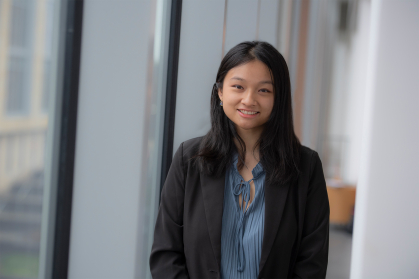
For Julianne Chan, who grew up in Manahawkin near the Jersey Shore, it's always been a case of water, water everywhere.
The Atlantic Ocean lies to the east, a short distance from her home. Miles of rivers course through the New Jersey Pinelands to the south and west, forming estuaries on the coast. The magnet high school she graduated from, the Marine Academy of Technology and Environmental Science, is eight miles west of Manahawkin Bay and Long Beach Island. In school, she immersed herself in courses such as oceanography, aquatic ecology, marine biology and environmental science and found they were her favorites.
It's a small wonder that Chan, a junior majoring in environmental engineering at the Rutgers School of Engineering and an Honors College student, has focused on water as her main subject.
“I’m currently working on a project in collaboration with the New Jersey Department of Environmental Protection, and we’re looking at microplastic concentrations in wastewater,” said Chan.
She is assisting in the lab of Nicole Fahrenfeld, an associate professor in the Department of Civil and Environmental Engineering in the Rutgers School of Engineering, who she met when she was interviewing for an internship position as part of the Aresty Research Center’s Summer Science Program. When Fahrenfeld told her she was looking for someone who would be committed to environmental engineering, Chan instantly thought: “That’s me.”
Chan so impressed her mentor that she was invited to stay beyond the summer of 2022.
"Julianne has been contributing to several projects on plastic pollution,” Fahrenfeld, who described Chan as “fantastic,” said. “She’s a co-author on one published manuscript, presenting her work at local and national conferences this spring, and taking a leadership role helping to train new students on our team.”
Chan loves engineering because of its practical nature.
“Engineering, in general, is really interesting in that you can learn things in the classroom and then apply them to the real world to make a solution that changes people's lives,” said Chan, who plans to earn a doctoral degree in environmental engineering.
She hopes to become a university professor and conduct research on how to remove environmental contaminants from water with support from the Environmental Protection Agency or the National Oceanic and Atmospheric Administration.
“Water is what connects the world,” she said. “Being able to keep our water clean affects everyone.”
– Kitta MacPherson
Anisha Jackson
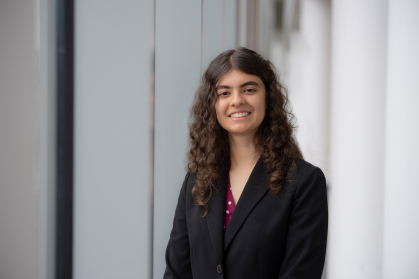
As a child, Anisha Jackson spent time in her backyard looking at “all sorts of samples” under a microscope.
Jackson’s scientific curiosity led her to begin research with the Waksman Institute of Microbiology at Rutgers through the Waksman Student Scholars Program as a first-year student in high school.
“I always knew I wanted to go into the STEM research field,” said Jackson, referring to the collective disciplines of science, technology, engineering and mathematics. “I never thought of it as formally being a scientist, but I always loved research and figuring out how things work.”
Now a junior pursuing a degree in biomedical engineering at the Rutgers School of Engineering, Jackson has poured her efforts into stem cell research. She aims to conduct bench-to-bedside research in regenerative tissue engineering in hopes of expanding treatment options for fatal diseases.
Jackson, a Stirling, N.J., resident who attended Watchung Hills Regional High School, said stem cells “can divide many times, and they can also differentiate or mature into different types of cells, like fat cells or bone cells or muscle cells.”
“My work specifically works in figuring out how we take these stem cells and grow them with conditions where they can proliferate and divide many times without losing that ability to differentiate and mature into different types of cells,” she said.
In 2022, Jackson took part in the Aresty Research Center’s summer program, working with Yong Mao, an associate research professor with the Department of Chemistry and Chemical Biology at the Rutgers School of Arts and Sciences.
Mao said she was "very impressed" with Jackson's enthusiasm and capability, noting Jackson was the youngest researcher on her team to publish in a peer-reviewed journal and a "perfect candidate" for the scholarship.
“She's really fantastic, just so proactively getting all the information,” Mao said of Jackson’s efforts, adding that the team “really made huge progress” and that their research was published.
"I think it's a really interesting field because we can use the patient's own biology to help cure them rather than giving them a synthetic drug or something else,” said Jackson, who enjoys playing piano as well as playing soccer in Rutgers intramural leagues. “This is going to be the next generation of medicine where we treat every patient as an individual with their own specific biology, their own symptoms and their own genetic makeup.”
Jackson said it is great to be recognized as a Goldwater Scholar and plans to use the scholarship to help with graduate school applications as well as “fund myself through graduate school.”
“It's also great in that it connects me with a network of other scholars too, and it's good to be part of another community,” she said.
– Mike Lucas
Annie Wei
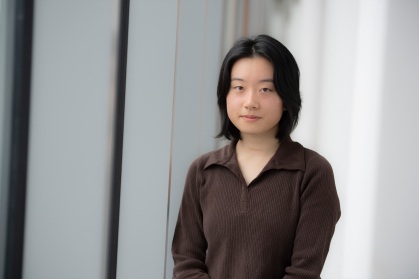
It’s not a class where you’re likely to find many undergraduates.
Indeed, the 500-level “Theory of Functions of Real Variable II” is a graduate course in mathematics that goes beyond what incoming doctoral students are expected to know for their qualifying exam.
But last year, Annie Wei, then a School of Arts and Sciences (SAS) sophomore, was among the 13 students in the class.
“I may have been a bit nervous,” said Wei, now a junior. “But I knew how much I wanted to study every day, what I wanted to read, and which problems I wanted to do.”
“Sometimes,” she added, “I’d ask the professor questions to make sure I was understanding it properly.”
That professor – the renowned Rutgers mathematician Yanyan Li – said Wei crushed it, earning an A for the course.
“My view was that she was in the top three of the class” said Li, a Distinguished Professor of Mathematics. “Annie not only excelled in completing all the homework assignments and tackling problems, she also actively participated in discussions, often raising insightful topics.”
Wei was first drawn to mathematics in middle school, discovering a love for Euclidean geometry.
“I remember having a lot of fun in that class and in putting together the proofs,” she said.
She feels right at home in the Department of Mathematics in SAS, long known for its research-rich culture.
“It is a very big department, and strong in many areas of math,” she said. “When I talk to professors and they tell me what they are working on, I get inspired.”
Wei intends to pursue a doctoral degree in mathematics and forge a career in teaching and research. Her area of interest is geometry and analysis.
“The Chinese word for ‘analysis’ means breaking things up into little pieces,” she said. “A lot of analysis is decomposing things into little pieces to understand them better. It takes a lot of work, but you eventually understand what is going on.”
– John Chadwick
